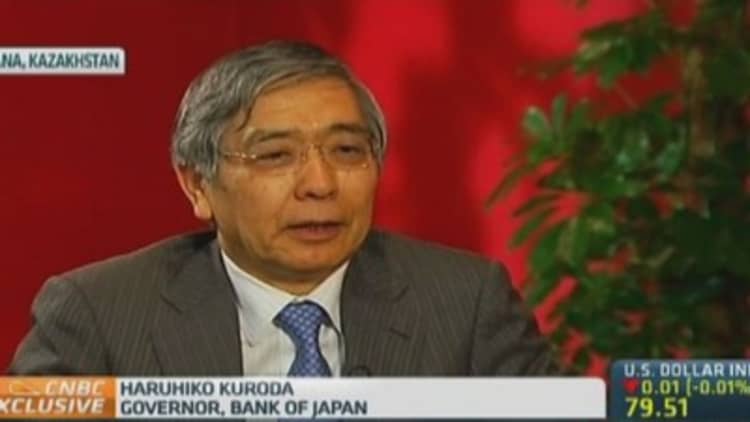
The impact of a hike in consumption tax on Japan's economy hasn't been as bad as feared, says the country's central bank chief, who predicts the effects to be contained and economic recovery to resume in the third quarter.
Japan raised its sales tax last month to 8 percent from 5 percent in a bid to bring down its hefty debt pile –the country has the world's largest debt-to-gross domestic product (GDP) ratio, at over two-to-one – but the decision has been panned by critics who warn that the move could derail the economy's nascent recovery.
Bank of Japan (BOJ) governor Haruhiko Kuroda notes that while consumption has fallen dramatically since the tax hike, he remains optimistic Japan's economy can shake off the ill-effects.
Read MoreJapan's sales tax hike: What you need to know
"Just before the consumption tax hike, consumption on expenditures on non-deliverables like automobiles etc, soared, [although] now they are declining quite sharply. But on balance, the decline after the tax hike had been as we expected or even less than we expected," Kuroda told CNBC at the weekend on the sidelines of the ADB annual meeting in Kazakhstan.
"So we don't think the negative impact of consumption tax hike would be contained and the economy would start to recover in the July-September quarter," he added.
Japan's economy grew 0.7 percent in the final quarter of 2013 to log its fifth straight quarter of positive growth. Credit has been given to "Abenomics"– the radical plans by Prime Minister Shinzo Abe to kickstart the economy – in which the BOJ played an important role in the aggressive easing of monetary policy.
Read More China to overtake US economy, India trumps Japan
The BOJ has also set a goal to increase consumer inflation rate to 2 percent by the end of fiscal 2015/2016, which Kuroda says remains on track.
Read MoreJapan's jobs market is getting tighter
"When we started the new monetary policy framework [last April], the inflation rate was negative 0.5 percent. Now it's positive 1.3 percent. So in twelve months, the inflationary situation has significantly changed," Kuroda said.
On wage growth, which has struggled to keep up with the rising inflation rate, Kuroda says the jobless rate, which remained at a near seven-year low of 3.6 percent in March, is an encouraging sign.
"Wages have started to rise and we expect nominal wages to continue to rise, coupled with improving employment situation mean that the employer's income would increase by about 3 percent," he said.
'Japan is back'
Special adviser to the Cabinet Office of Japan, William Saito, said the nation was bouncing back as fundamental change took hold across Japan.
"The prime minister has visited the most countries out of all the prime ministers and the reception has been great. You see fundamental change on the ground and an up welling of confidence from people, even with things like the sales tax increase," Saito told CNBC at an OECD gathering in Paris.
"Abenomics is trying to undo 20 years of momentum, it is taking a while but there are structural changes that are happening. On the ground, you do see big changes especially in the area of innovation and how that has changed entrepreneurship and businesses," he said.
Kuroda refused to be drawn into commenting on the prospect of further action from the BOJ, which has pledged to increase base money supply at an annual pace of 60 trillion to 70 trillion yen, but says policymakers would be willing to act if the need arises.
"Two percent [consumer inflation rate] is still a long way to go. We are only [at] halfway [mark]; so far, so good, but there could be many risks including downside risks… if necessary we can add, we can adjust our monetary policy without hesitation if necessary," he said.
"At this stage the economy has been overcoming the impact of the consumption tax hike, so at this stage domestic situation may be okay, but external factors are difficult to expect, predict, and difficult to manage," he added.

